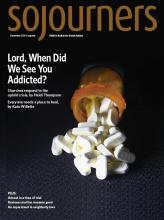OVER THE PAST several months, Republicans in Congress tried time after time to make good on their seven-year threat to “repeal and replace” the Affordable Care Act. Each time a wide variety of groups stepped up to protect the vulnerable and ensure that millions of Americans continue to receive the health care they deserve. At several critical junctures, Christians played an important role.
This summer, for instance, a clear witness against health-care repeal was brought together by the Circle of Protection, a coalition of Christians we help convene who have come together around the biblical mandate to protect poor and vulnerable people. All the families of our faith—the National Association of Evangelicals and the National Council of Churches, the Catholic Church and the Salvation Army, and most of our denominations—came together to say: We may differ on many things, but we are joining to protect the people Christ has called us to protect. The group urged political leaders to pursue “options that do not ask our poorest neighbors to bear most of the weight of budget and health-care cuts.”
Back in July, on the very day a repeal vote was scheduled, about 20 of us showed up outside the Senate chamber door in response to a request from a senator. We were from many different traditions and denominations—Catholic, evangelical, Protestant, black churches, Latino churches—and we started praying outside the door.
Read the Full Article

